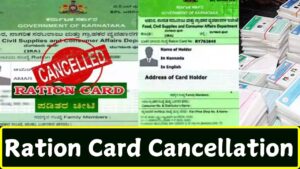Ration Card Cancellation
Ration Card Cancellation
Ration cards are a fundamental aspect of India’s public distribution system, providing subsidized food and serving as identification for various government schemes. However, as circumstances change, cancellation of ration cards becomes essential to maintain fairness and ensure resources are allocated to the rightful beneficiaries. This summary outlines the key aspects of ration card cancellation, including its reasons, processes, and impacts.

Introduction to Ration Cards
Ration cards are issued under the National Food Security Act (NFSA) and are categorized into Antyodaya Anna Yojana (AAY), Below Poverty Line (BPL), and Above Poverty Line (APL). Digitization has modernized the system, making it easier for the government to track and manage beneficiaries.
Reasons for Ration Card Cancellation
Ration cards may need to be canceled due to the following reasons:
- Ineligibility: When a household’s income exceeds eligibility criteria or when multiple cards are held fraudulently.
- Migration or Death: Families relocating or removal of deceased members.
- False Information: Cases involving fake documents or fraudulent claims.
- Voluntary Surrender: Citizens voluntarily relinquishing their ration cards due to improved financial status.
Legal Provisions for Cancellation
The NFSA and state-level rules govern the cancellation process. Misuse of ration cards can lead to penalties, and legal action may be taken against offenders. Courts have also emphasized eliminating fake beneficiaries to uphold fairness in resource distribution.
How to Cancel a Ration Card
Manual Process
- Visit the nearest ration office.
- Submit a cancellation application along with required documents.
- Authorities verify the details and notify applicants upon successful cancellation.
Online Process
- Log in to the state-specific public distribution system (PDS) portal.
- Fill out the cancellation form and upload necessary documents.
- Receive confirmation via email or SMS.
Mobile Applications
Official government apps simplify the cancellation process, integrating Aadhaar for verification and reducing manual errors.
Documents Required
Key documents include:
- Original ration card
- Aadhaar card
- Proof of ineligibility (e.g., income certificate)
- Death certificate (if applicable)
- Address proof (for migration cases)
Challenges During Cancellation
Several issues can arise during the process, such as incomplete details, document discrepancies, technical glitches in online systems, and lack of awareness about procedures. Delays by authorities also contribute to frustration among applicants.
Resolving Issues
To address challenges:
- Ensure all documents are accurate and updated.
- Use online grievance portals and helplines for assistance.
- Escalate unresolved issues to higher authorities or consumer protection offices.
Impact of Ration Card Cancellation
Positive Impacts
- Eliminates fraudulent claims.
- Ensures resources reach deserving beneficiaries.
- Enhances efficiency in government programs.
Negative Impacts
- Administrative errors may unintentionally exclude genuine beneficiaries.
- Migrant workers and urban poor may face difficulties due to frequent relocations.
Role of Technology
Technological advancements like Aadhaar integration, biometric systems, and real-time tracking have streamlined the cancellation process. These tools ensure transparency and reduce errors, making the system more effective.
State-Wise Cancellation Processes
Each state in India has unique rules and methods for ration card cancellation. For example:
- Karnataka: Offers both manual and online cancellation options.
- Tamil Nadu: Features a user-friendly portal for quick cancellations.
- Uttar Pradesh: Uses Aadhaar-based verification for authenticity.
- Telangana and Andhra Pradesh: Leverage mobile apps for convenience.
Reapplying for a Ration Card
If a ration card is canceled, eligible households can reapply by submitting a new application at the PDS office or online. Supporting documents and updated eligibility information must be provided.
Future of Ration Card Systems
The “One Nation, One Ration Card” (ONORC) initiative aims to enable portability of ration cards across states, benefiting migrant workers and mobile populations. Blockchain and advanced technologies are also being considered to enhance transparency and security in the system.
FAQs
Common questions include:
- Can a canceled card be reinstated? (Yes, under specific circumstances.)
- What happens if a canceled card is misused? (Legal penalties apply.)
- How long does the cancellation process take? (Typically 7-30 days, depending on the state.)
Conclusion
Ration card cancellation is a crucial step in maintaining the integrity of India’s public distribution system. By removing ineligible or fraudulent beneficiaries, the government can ensure that subsidies and resources reach those who need them most. Citizens must be proactive in updating their eligibility status and using resources responsibly to support a fair and efficient system.
This concise guide offers a clear understanding of ration card cancellation, its processes, and its broader implications for society.
